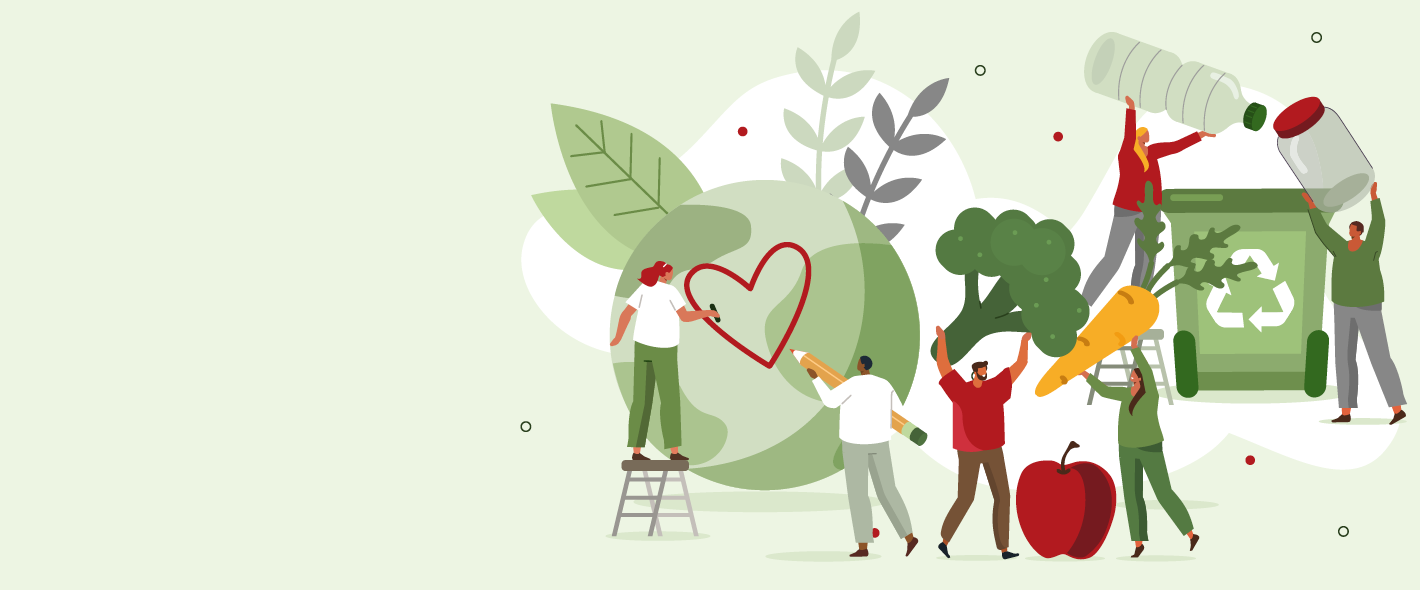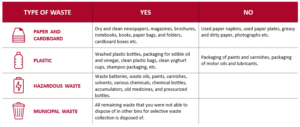
TOGETHER WE CARE ABOUT THE ENVIRONMENT FOR OUR BETTER FUTURE!
At Aluflexpack, we place a high priority on caring for the environment, properly separating waste, recycling, and disposing of it. As a flexible packaging manufacturer, we are at the beginning of the packaging creation process, and we are directing our efforts towards creating packaging that can be recycled.
In our production, waste is properly managed – recycled, recovered or appropriately disposed, and all our employees are well educated on these processes.
Still, we are well aware that caring about the environment starts with each of us. Therefore we are starting with a series of internal activities, workshops and education that will enable our employees to manage waste not only in the workplace but also in daily life.
By implementing small changes in everyday life, each individual can significantly contribute to reducing waste!
Few simple steps for the environment that anyone can follow:
1. PLAN:
Plan meals – Planning meals in advance allows you to buy only what you need, reducing the likelihood of food going to waste.
Buy according to needs, especially if it is food with a shorter shelf life (e.g. fruits and vegetables, dairy products like milk and yoghurt etc) – Buying according to needs minimizes food waste, reduces emissions, conserves resources, and supports sustainable practices, promoting environmental sustainability. This helps minimize food waste, which in turn reduces methane emissions from landfills and conserves resources used in food production. Also, it conserves resources such as water, energy, and materials used in the production and transportation of food.
Pay attention to the shelf life of products – Check the shelf life of food that you already have and plan your meals to use them in time. Checking your stock before going shopping will enable you to use the product before expiring, and not buy too many products that will expire without being used. By consuming food before it spoils, less food is thrown away, reducing the amount of organic waste that ends up in landfills.
Pay attention to the correct storage of food – Properly storing food helps prevent premature spoilage and extends its shelf life, reducing the amount of food that ends up in landfills. When food is wasted, it not only contributes to methane emissions as it decomposes but also wastes the resources used to produce and transport it. By storing food correctly, we can minimize waste, conserve resources, and reduce our overall environmental footprint.
2. REUSE:
Use reusable shopping bags – Using reusable shopping bags helps the environment by reducing the demand for single-use plastic bags, which are a major source of pollution. Plastic bags take a long time to decompose and often end up in oceans, harming marine life and ecosystems. By opting for reusable bags, we can reduce the amount of plastic waste generated and help conserve natural resources.
Use reusable water bottles and coffee cups – Disposable plastic water bottles and coffee cups contribute to plastic pollution, which harms marine life and ecosystems. By using reusable bottles and cups, we can significantly reduce the amount of plastic waste generated. This is a simple yet effective way to reduce waste, conserve resources, and promote a healthier planet for future generations.
Repair or mend items instead of immediately replacing them – Repairing items extends their lifespan, reducing the amount of waste that ends up in landfills. This helps mitigate the environmental impact of waste disposal, including the release of greenhouse gases and leachate from landfills.
3. REDUCE:
Use printers for documents and files only when necessary – Printing documents and files only when necessary can help the environment by reducing paper consumption, which in turn conserves trees and reduces carbon emissions associated with paper production and transportation. Additionally, it reduces waste generation and minimizes the environmental impact of ink and toner cartridges.
Reduce the use of disposable cups for coffee and water – Disposable plastic water bottles and coffee cups contribute to plastic pollution, which harms marine life and ecosystems.
Use electricity carefully and turn off unnecessary lighting in rooms where you are not staying. This helps conserve energy resources and lowers the demand for electricity generation, which often relies on fossil fuels that contribute to air pollution and climate change.
Use water carefully – Turn off the tap so the water doesn’t run the entire time you’re washing your hands, choose a quick shower instead of a long bath. This way you help conserve freshwater resources.
The remaining waste needs to be properly recycled:
Make sure to check for waste sorting bins in the offices and common areas!

